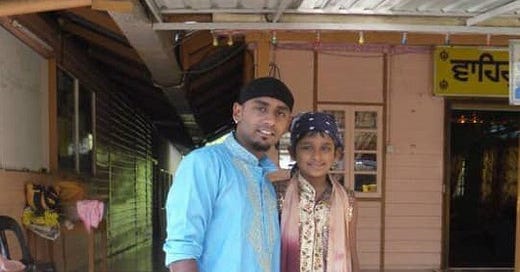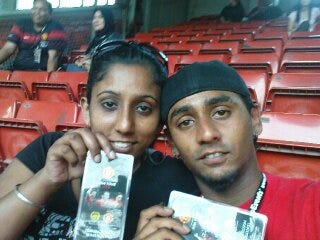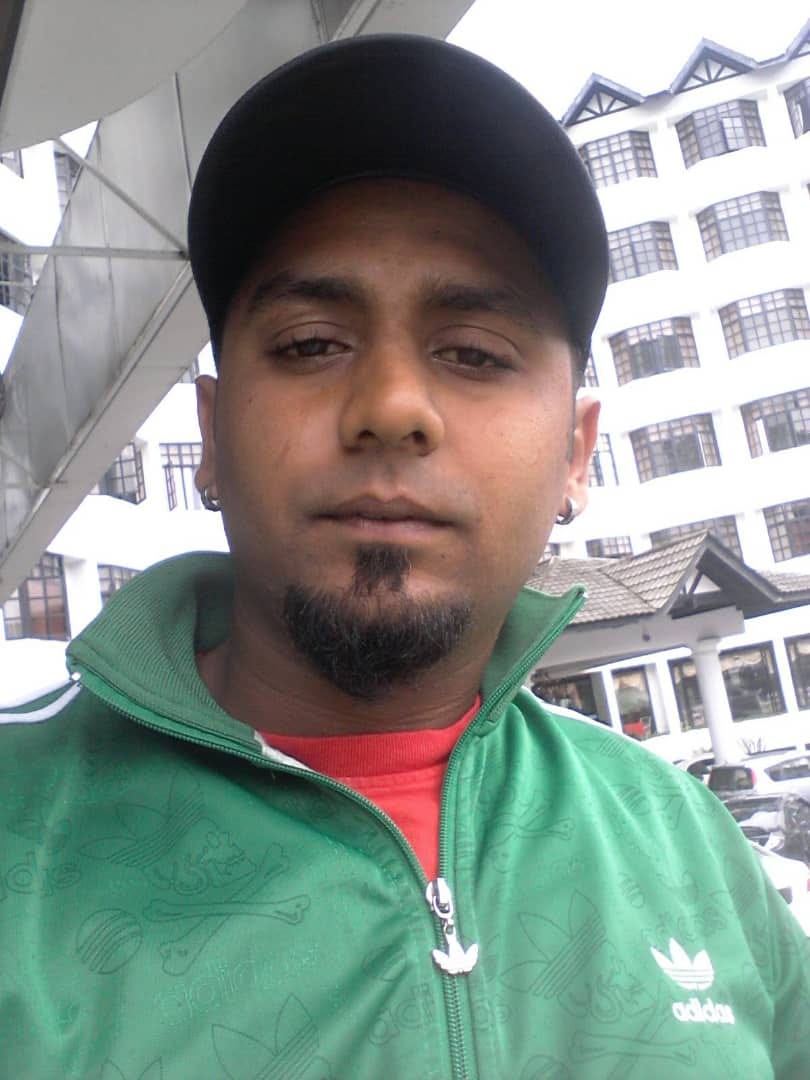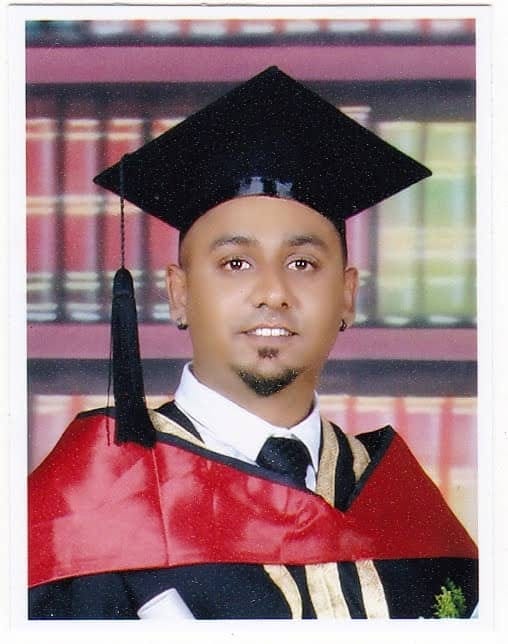“I will fight till the noose is around my neck”
Kalwant Singh and his family will not give up, and neither should we.
Malaysian Kalwant Singh and Singaporean Norasharee Bin Gous have been scheduled for execution in three days, on 7 July 2022, at Changi Prison in Singapore. These are the 7th and 8th executions to be scheduled in Singapore so far this year — all of people convicted for participating in the drug trade and sentenced under Singapore’s mandatory death penalty regime. Last-minute legal applications have managed to delay four executions. We’ve lost Abdul Kahar bin Othman and Nagaenthran Dharmalingam. Will we lose Kalwant and Norasharee this week, or will we #stopthekilling?
This is Kalwant’s story.
When Kalwant was four years old, growing up in Cameron Highlands, he snuck out of the house one day, got into the driver’s seat of his father’s land rover and started the vehicle. His family, who were watching TV indoors, saw the car move out of the corner of their eye and rushed out, alarmed. After rolling about 200 metres down the hill, one of the car’s tyres got stuck in a drain, bringing the rover to a stop.
“It’s a miracle he lived! It’s a steep hill, you know! Can you imagine if the tyre didn’t get stuck? He was so naughty!” Sonia, his sister, exclaims.
Their father was a farm worker and as children, Kalwant and Sonia would go with their father to harvest cabbage, French beans, strawberries, chillies and tomatoes from farms around Cameron Highlands. The siblings would squabble over the juicy strawberries they got to keep.
Their idyllic life in the hills was disrupted when Kalwant’s mother died suddenly – he was just a 12 year-old boy then. After his mother’s death, Kalwant grew withdrawn, staying out of the house more and more. But he stayed close to Sonia, who was 9 years older than him. When Sonia had a baby – Kellvina – Kalwant fell in love with the child immediately and took her under his wing. A single mum, Sonia worked in Kuala Lumpur to earn a living and support her family, while Kalwant cared for Kellvina.
“He’s the one who raised her,” Sonia keeps repeating. “He’s her baby girl.”
When we talk, Sonia and Kellvina are upbeat, and eager to share stories about Kalwant. Their eyes glisten with love, and then quickly brim over with uncontrollable tears.
Kalwant left school at seventeen, and started working odd jobs as a waiter, a courier, a tour guide, a truck driver. He was inseparable from his cousin Sukhjeet, whom he calls ‘adek’. They were (and still are) huge Manchester United fans. Sonia loves to tell the story of how, when Man U came to Malaysia for the first time, Kalwant bought his sister and himself outrageously expensive tickets. Sonia still remembers exactly how much they cost - RM 480 each. “I didn’t even care about Man U! And it was a big sum of money to him, but he wanted me to be part of all the fun. And wah, how much fun we had!”
In 2011, Kalwant started commuting daily to Singapore for work from Johor Bahru, as many Malaysians do. He was a mortuary worker at a local hospital here. He had a girlfriend, he seemed happy. Meanwhile, in Kuala Lumpur, Sonia found herself slowly fading away. By 2013, Sonia had been struggling with depression and unemployment for some time, and felt stuck in a rut she didn’t know how to get out of. One day, Kalwant called her and asked if she would like to come live with him. He said he was worried for her and wanted to take care of her. Sonia immediately agreed. Kalwant’s invitation gave her much-needed hope, and she started making plans to move. A few weeks later, Kalwant was arrested.
“I have so many “what ifs”,” Sonia says regretfully. “What if he’d never moved to JB? What if I’d checked in on him more? What if, what if.”
After Kalwant was arrested, his father, who was then driving a taxi, started working himself to the bone so that he could afford to make the regular trips to Singapore to see Kalwant and pay the lawyer they had hired for Kalwant.
“After my father died last year, I checked the odometer on his taxi. It showed 820,000 kilometres. That’s how much he had driven for Kalwant. Every morning, he started the car at 4am, and drove nonstop. He took every job.”
This was the taxi in which the family came to see Kalwant, all the way from Cameron Highlands. After visiting him in prison, they would often park at Changi Village and sleep in the car. Then, they would visit Kalwant once more the next morning (back when families who were coming from further away were allowed two visits since they couldn’t come as often) and drive back home.
“Once, when he came on his own, my father even slept in the toilet at Changi beach,” Sonia recalls sadly. “He was the most dedicated visitor, he always showed up for Kalwant. Till he died, my father believed Kalwant would come back home. He had so much faith.”
“My father’s last visit with him was in March 2020. In Feb 2021, he was diagnosed with cancer, and just three months later, he died. Kalwant dreaded this all along – people he loved dying while he was trapped in prison, without even knowing what had happened till weeks or months later. “How will you come and tell me when papa dies?” he used to ask me.”
“The first eight months after Kalwant was arrested, my father cried at every visit. Then, Kalwant and I made a rule. No more crying. We spent the little time we had together laughing, gossiping and joking. Kellvina, who was 11 when Kalwant was arrested, would dance for him in the visit room! She wrote him letters full of jokes and riddles that made her a star on death row. She’s not just ‘baby girl’ to Kalwant. She’s ‘baby girl’ to all the boys on death row, even the officers. All the officers looked forward to her letters. Because they read each letter before passing it to the prisoner, they also enjoyed trying to solve her riddles.”
‘Baby girl’ is now 21 years old. She still shares all her secrets with Kalwant. “When I ask him to take care, he always says “Don’t worry about me, I’m a VIP, I have very high security!” He is always trying to cheer us up.”
Kellvina had a surprise for Kalwant during their last visit. She had gotten herself braces with a small amount of money Kalwant had left in a bank account back home. These ways of staying connected, of continuing his role in her life, of providing for her, mean a lot to both of them. She’s always teasing him about the 70+ dollars he’s saved up over these 9 years in prison. “That’s all for me, right?” she keeps asking him. Everything he has is hers, he assures her.
Sonia boasts about Kalwant’s prison ‘report card’. “The officers always say nice things about Kalwant. I like to tease him – if only his report card in school was so good!”
“Sukhjeet and I always fantasise about what we’ll do when Kalwant comes back home. Would we throw a grand celebration, as if it was his wedding? What would we say? Where would Kalwant want to go first? I joke with Kalwant about running away from prison, and where we could hide him. “Send me to India, they’ll never find me there!” he will laugh.”
“These are the kinds of wild thoughts you have, it’s the only way we cope. Kalwant and I even sometimes talk light-heartedly about all the other ways he could’ve died, something cool that we could remember proudly. It sounds morbid, I know. But what else can we do?”
“I still have dreams for his life, you know? I want him to marry Kellvina off. I want him to have kids, grow old. I can’t give that up,” Sonia admits.
Like so many others on death row, Kalwant tries his best not to reveal his pain to his family. Once, he told Sonia, “this place is not for humans”. Otherwise, he doesn’t share much about life in prison, because he doesn’t want it to weigh on his family. But they agonise about it all the same.
“I always think…he’s such a restless boy, full of energy. How can he live locked up within four walls for all these years? How is he still going on?” Sonia wonders.
Then she says, “We are fighting for his life, but we also want him to come home, live a real life. Not go on living in that hell forever. So when I pray, I always pray ‘let him come home today, or let him die today [of natural causes]’ because I don’t want him to live like that.”
Kalwant’s closest friend on death row was Prabagaran Srivijayan, who was executed in 2017. They teased each other relentlessly. When Praba’s execution date was near, he would joke with Kalwant (in Tamil), “Eh Singh, if you give me a hard time, I’ll haunt you every night. I won’t let you sleep!”
The night before Praba’s execution, he told Kalwant to ask Sonia to look after Praba’s mum, who didn’t have any other immediate family members beyond Praba.
“I haven’t been able to bring myself to speak to her. I don’t know what to say, how to face her after what she’s lost,” Sonia confesses.
Over the last few years, Kalwant has grown close to Pannir Selvam, who is also a Malaysian, and a poet and songwriter. “I am the one who QCs (quality control) all his writing,” Kalwant tells Sonia proudly. He tells her that Pannir looks out for him, and helps him with whatever he needs.
The last few days, when she’s had visits with Kalwant, she sometimes sees Norasharee come out for visits with his family. “He always asks me, “kak, how is baby girl? How is your leg? Take care of your leg! Let me know if you need anything, I’ll ask my family to help.” All of them, they care about each other so much.”
When I speak to families of people on death row, something that always comes up is how everything that was once enjoyable becomes fraught with guilt and grief.
“Most people love dawn, they think it’s a time of peace and serenity, life beginning. But I hate dawn. I can’t stand to be awake at dawn, because that’s when they hang them. I can’t enjoy TV, chocolate – all the things I used to take pleasure in, because every time you experience something, you think about how he can’t. You think about all the things he loves that he can’t have,” Sonia explains.
Sonia says Kalwant keeps trying to reassure her that he’s accepted that he might be executed, despite all their efforts. He says he’s been so single-minded in his prayers and meditation that he is confident he will pass through to a peaceful place. “If I have to face it, I will face it with courage,” he tells her.
“But no one is ready to go, Koki. Not like this,” Sonia tells me. “When my father was alive, he would say he wishes he could help Kalwant end his own life, rather than to go through this.” It makes me reflect again on the perversity of a system that wants you dead, but only by its hands, at the time it sets. From the time they are first detained, prison regulations go to great lengths to make sure that prisoners can’t end their own lives. From the pens and toothbrushes prisoners are given, every effort is made to make sure they can’t hurt themselves physically with these objects. They have to be kept alive, so that they can be killed.
One can prepare oneself for death, or choose one’s own death. But how can one prepare for routine state murder? Where while you are very alive, a few last visits are facilitated, some photos are taken, your family is asked to secure an undertaker – all these things done in the coldest, most banal ways, with forms and protocols. And then at the designated time, guards come to your cell and usher you to the gallows so your neck can be broken by a pre-measured length of rope.
I have to discuss with Sonia who from her family will go in to identify Kalwant if the execution goes ahead – we have to fill out their details in one of the forms the prison has given the family We talk about some possibilities. Then she’s quiet for a minute, and her eyes glaze over. “No one should have to go through this.”
A few hours after the prison called Sonia to say that Kalwant’s execution would be carried out on 7 July, Kalwant calls her. “I will fight till the noose is around my neck,” he assures her.
Kellvina flew to Singapore the same night. The next morning, Sonia and other relatives arrived. More will join them the next few days. About their visits, everyone says the same thing. “It is full of laughter. Kalwant keeps cracking us up. He has a joke about everything.”
They’ve been talking a lot about Kalwant’s childhood, and all the antics Sonia, Sukhjeet and he got up to. He tells Kellvina about the time the three of them had been tasked to clean the gurudwara, and they started singing and playing rock songs with the instruments, not realising that that the mic was on, and all the aunties and uncles could hear their little ‘concert’.
“He is in such good spirits, so we have to be too,” Kellvina and Sonia tell me. Kellvina taunts him about how some of the akkas (sisters) she has met from the Transformative Justice Collective since she’s arrived are so pretty. “Here I am counting my days, and you’re telling me about pretty girls!” Kalwant complains. He likes reminding her of how he used to carry her around, put her to sleep and clean her bum, when she was a baby.
“I have hope he will get a stay of execution,” Sonia keeps saying. “I don’t think this is end.”
This shouldn’t have to be how it ends. We have to abolish the death penalty, to recover our humanity.
At Nagen’s wake, an older Tamil man said to me with tears in his eyes, “I asked for his forgiveness, amma, for what we’ve done to him. We will all suffer for this. Singapore will suffer. It’s not right, amma. It’s not right.”
Sometimes, I tell myself this may be a long fight. But my heart doesn’t accept it. We’ve already lost so many to this senseless violence. This cannot be a long fight, because losing Kalwant, Norasharee, Datchina, Syed, Rosman, Roslan, Iskander, Pannir, Reduan, Saminathan, Tina, Saridewi and many others on death row is too great a cost. Their infinite, sacred lives are not ours to take. With this blood on our hands, there can be no peace in our communities.
End oppression, not life.
End poverty, not life.
End desperation, not life.







